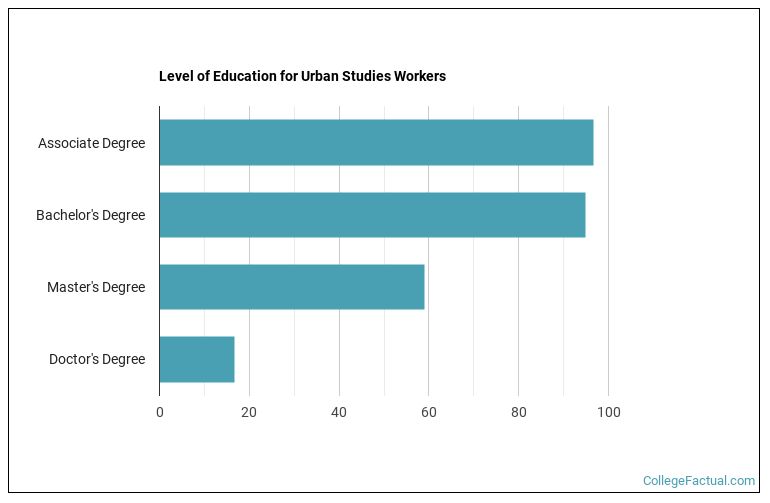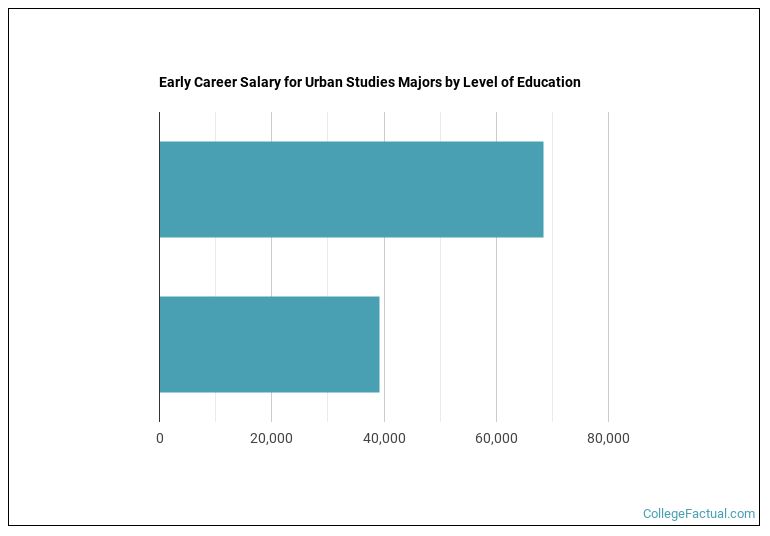 by our College Data Analytics Team
by our College Data Analytics TeamDo you get energized by the hustle-and-bustle of cities and want to make them better places to live? If so, a major in Urban Studies might be right for you! This major focuses on the application of social science principles to the study of urban living. You will learn how city dwellers live and what influences their social and political life. Upon graduating with a degree in urban studies, you will be prepared to solve complicated issues that affect cities.
Urban Studies is an interdisciplinary major. Since cities are made up of many different facets, it is important to gain a working knowledge of many related fields. Classes include subjects like history, public policy, government, economics, sociology, social theory, urban theory, history of urban areas, principles of urban and social planning, and the politics and economics of urban government and services.
Urban Studies was the 209th most popular major in the 2021-2022 school year. Colleges in the United States reported awarding 1,453 degrees in this year alone. This year's Best Urban Studies Schools ranking compares 38 of them to identify the best overall programs in the country. Continue reading to check out one of our many unbiased rankings of urban studies programs later in this article.
The field of urban development and planning is a dynamic and diverse profession requiring a broad range of skills. No matter what career direction you take, you will be asked to look and solve problems of urban life. This means you should be able to understand people and have a passion for improving human life. You will spend much of your time analyzing demographic information to dissect trends and draw conclusions.
Students should gain an understanding of local, state, and federal government programs and processes. Other important skills to have are the ability to think critically, problem solve, and analyze data. Cities have diverse populations so you should be prepared to work well with many different people.
New students will need to have completed high school or a GED program and each school will have their own minimum GPA and SAT/ACT test requirements. Specific urban studies careers may require a certain level of degree attainment or additional certifications beyond that.
There are many different urban studies degree levels. Urban Studies programs offered by schools range from a to a , which is the highest urban studies degree you can get. Urban Studies programs can take anywhere between one to four or more years for a full-time student to complete.
| Degree | Credit Requirements | Typical Program Length |
|---|---|---|
| Associate Degree | 60-70 credits | 2 years |
| Bachelor’s Degree | 120 credits | 4 years |
| Master’s Degree | 50-70 credits | 1-3 years |
| Doctorate | Program required coursework including thesis or dissertation | At least 4 years |
A master's degree is the most common level of education achieved by those in careers related to urban studies, with approximately 39.0% of workers getting one. Find out other typical degree levels for urban studies workers below.
| Level of Education | Percentage of Workers |
|---|---|
| Master’s Degree | 42.6% |
| Bachelor’s Degree | 35.3% |
| Doctoral Degree | 14.1% |
| First Professional Degree | 2.6% |
| Associate’s Degree (or other 2-year degree) | 1.7% |
Most workers in urban studies have at least a master's degree. The chart below shows what degree level those who work in urban studies have obtained.

The education level required is different depending on the urban studies career you are seeking.
Urban Studies majors will be able to go in careers in business, government, law politics, public policy, advocacy, and academics. Common career titles for an Urban Studies major are city planner, community organizer, director of housing development, homeless advocate, transit planner, and zoning administrator. Some careers may require advanced training.
Want a job when you graduate with your urban studies degree? Urban Studies careers are expected to grow 8.2% between 2016 and 2026.
The following options are some of the most in-demand careers related to urban studies.
| Occupation Name | Projected Jobs | Expected Growth |
|---|---|---|
| Managers | 1,071,700 | 8.0% |
| Urban and Regional Planners | 40,600 | 12.8% |
| Social Sciences Professors | 16,800 | 9.8% |
| Sociologists | 3,500 | 0.0% |
Urban Studies graduates between <nil> reported earning an average of $44,713 in the <nil> timeframe. Earnings can range from as low as $27,966 to as high as $76,569. As you might expect, salaries for urban studies graduates vary depending on the level of education that was acquired.

Salaries for urban studies graduates can vary widely by the occupation you choose as well. The following table shows the top highest paying careers urban studies grads often go into.
| Occupation Name | Median Average Salary |
|---|---|
| Managers | $115,590 |
| Sociologists | $90,290 |
| Social Sciences Professors | $87,950 |
| Urban and Regional Planners | $76,240 |
With over 210 different urban studies degree programs to choose from, finding the best fit for you can be a challenge. Fortunately you have come to the right place. We have analyzed all of these schools to come up with hundreds of unbiased urban studies school rankings to help you with this.
Urban Studies is one of 13 different types of Social Sciences programs to choose from.
| Major | Annual Graduates |
|---|---|
| Urban Studies/Affairs | 1,453 |
| Related Major | Annual Graduates |
|---|---|
| Economics | 47,809 |
| Political Science & Government | 47,686 |
| Sociology | 35,816 |
| General Social Sciences | 17,338 |
| International Relations & National Security | 13,958 |
Image Credit: By Andrew Bossi under License More about our data sources and methodologies.